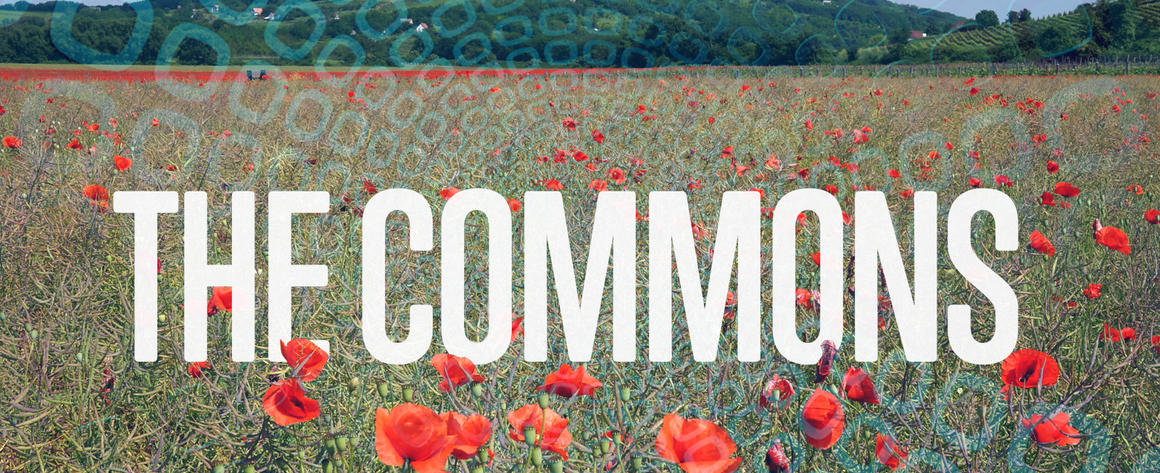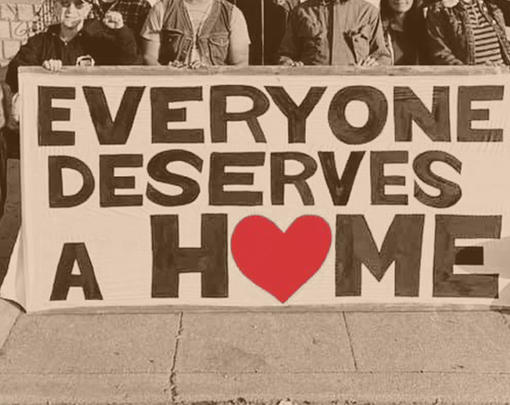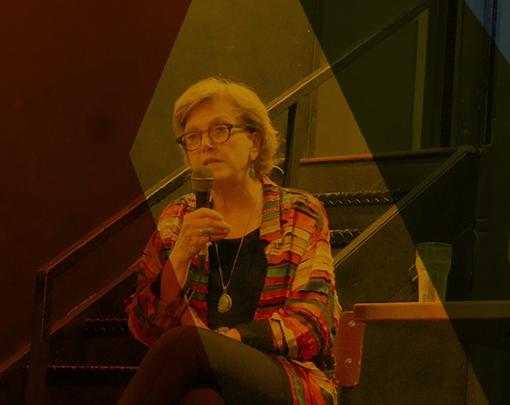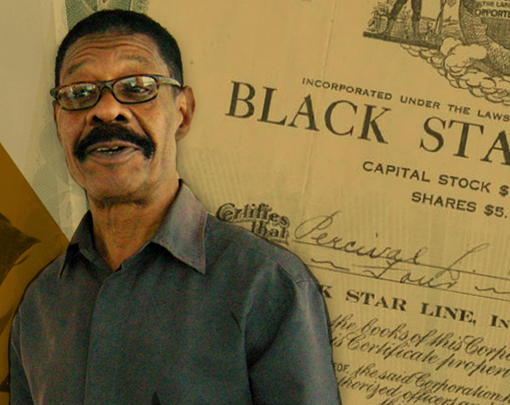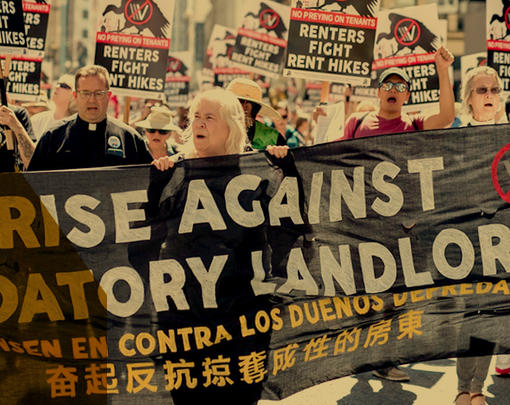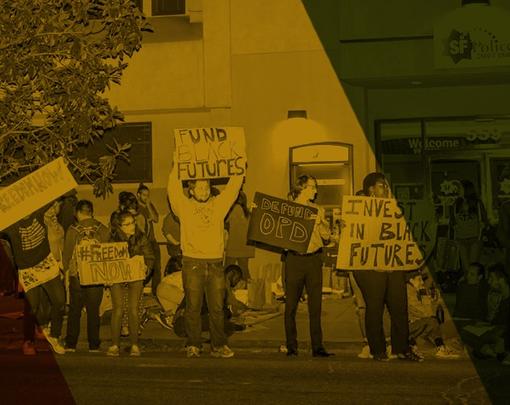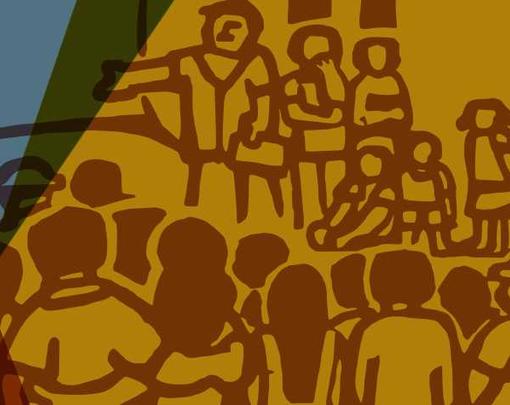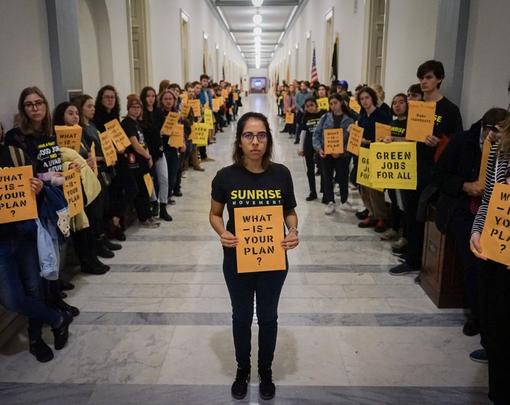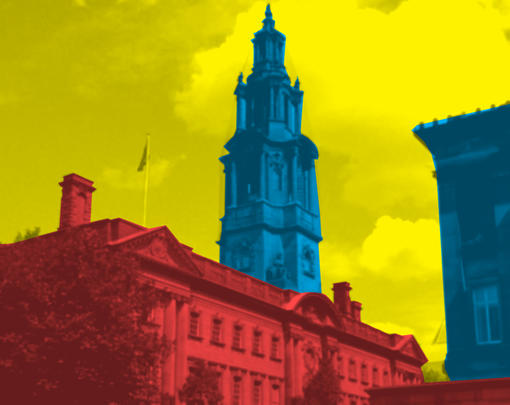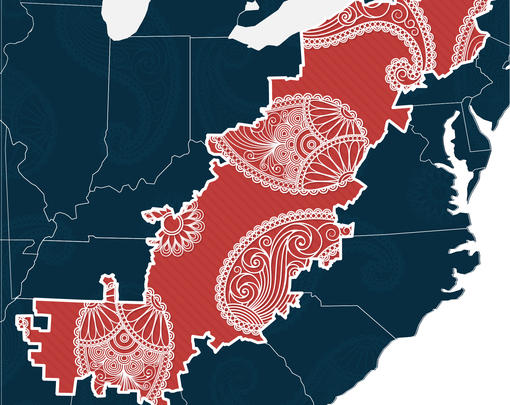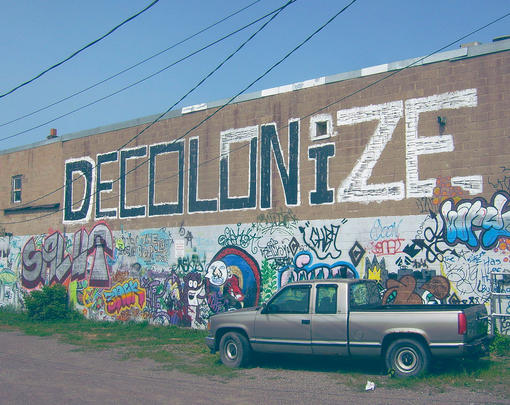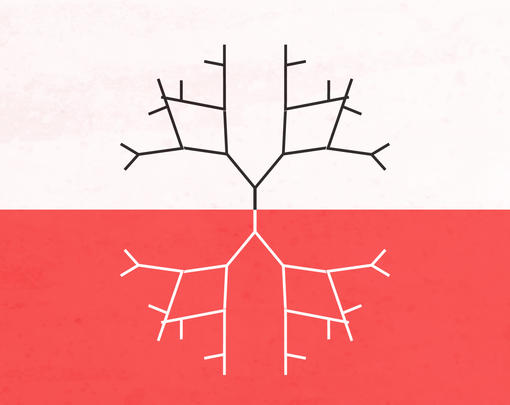David Bollier joins us this week to discuss “the commons” and what such a concept means for social transformation. You can read more about David’s ideas in his paper for the NewSystems: Possibilities and Proposals series, and also read more of his work at www.Bollier.org.
Subscribe to the Next System Podcast via iTunes, Soundcloud, Google Play, Stitcher Radio, or RSS.
Adam Simpson: Welcome back to The Next System Podcast. I’m your host, Adam Simpson, joined today by self-described commons activist and rirector of the Reinventing the Commons Program at the Schumacher Center for a New Economics, David Bollier. David is the author of Think Like a Commoner: A Short Introduction to the Life of the Commons. He’s also the editor of From Bitcoin to Burning Man and Beyond with John Clippinger, as well as Patterns of Commoning, and The Wealth of the Commons with Silke Helfrich.
Wouldn’t you know it, David is here to talk to me today about the concept of the commons. David, welcome to The Next System Podcast.
David Bollier: It’s great to be here.
Adam Simpson: Great. Well, before we get into the concept of the commons, David, I wanted to ask you: How did you first come to learn about this concept, what made you embrace it, what really drew you to this kind of work that you do?
David Bollier: Well, in the 1970s and 80s when I was working for Ralph Nader, all of my friends were fighting what I would now call enclosures of the commons, meaning privatization and commodification of things like federally funded research, public lands and the air waves, which are used by broadcasters for free and so forth. All these were being taken private, but we really didn’t have a language for talking about this. It wasn’t until the late 1990s and early 2000s when I encountered the work of Elinor Ostrom, a great scholar of the commons and I realized that the commons was a great way to describe how things get done outside of the market and the state, meaning through self-organized activities and self-governance to manage projects that create things of value. I realized this at a time when neoliberal capitalism and its policies were getting worse and worse.
It was essentially colonizing and taking over all of these commons in our life. Not only the resources that belong to us, but our ability to self-manage them for our benefit. They were basically appropriated by the corporate world for global trade and turned into private property.
I realized that the commons had great potential as an alternative political vision that is not some unified movement or ideology, like in the past, but something that is locally distributed and grounded in things that people love and want to protect. So, the commons is about sharing those things that belong to all of us that we want to protect in our ability to manage them for our purposes.
Adam Simpson: Right. It seems like you started with intellectual property as a way of thinking about the commons, and not, say, the management of environmental resources?
David Bollier: Well, that was actually, you might say the proximate cause, because in the late 90s you may recall the world wide web had just gone live in 1991, and here was a system that encouraged automatic sharing, yet copyright was being asserted to prevent us from sharing…
Adam Simpson: This was the time of Napster…
David Bollier: Yes, it was the time of Napster; it was the time of the emergence of open source software, and then a few years later, of the blogosphere and many other innovations. All innovations in which value and creativity was based on sharing and collaboration, something that conventional economics and markets don’t understand because they want to create things that are artificially scarce and individually ownable, as opposed to something that’s shared.
Copyright was a very important force for me in bringing into focus that we needed to protect our commons, and in fact, I helped co-create the group called Public Knowledge. It’s a Washington advocacy group to protect the knowledge commons: on Internet and telecommunications policy, it’s trying to protect shareable information.
Adam Simpson: Yeah. It reminds me that one of my first interactions with this space would have been the late Aaron Schwartz and his work on public knowledge.
David Bollier: A real pioneer. I mean, there was whole movement that has ebbed and flowed, but Larry Lessig, when he established Creative Commons licenses to allow legal sharing of content, that was a huge innovation. It provided a legal infrastructure for people to share. You have to remember, copyright was based on any little scribble or a guitar riff being born as private property. There was no way for stuff to be legally shared, so everything was implicitly piracy if you simply imitated or used somebody else’s work. Creative Commons licenses were an enormous innovation that did what Congress or federal authorities would not do, which is to legalize sharing.
Adam Simpson: I heard you imply a critical take on Elinor Ostrom’s work when you said that she focused on the commons in terms of resources, could you elucidate what you meant?
David Bollier: Let’s first introduce Elinor Ostrom. I mean she was a Indiana University political scientist who, over the course of 30 or 40 years, from the 1970s until her death in 2012, studied lots of natural resource-based commons: forests, fisheries, farm land, irrigation water, etc. She showed that contrary to the whole “tragedy of the commons” fable that Garret Hardin proposed in a famous 1968 essay, people can and do self-organize to sustainably manage resources. Her life’s work was, first of all, studying that on the ground level and then creatively theorizing to explain how and why that occurs. Well, she, as a woman working in the male-dominated economics professions, saw that social relationships mattered in creating things of economic value. That was a lot of what her work was about. But, at the end the day, she’s working within a rational economic framework as opposed to a cultural or social framework.
In some ways, she was providing an interesting counterpoint to the conventional economic theories. In other ways, she was still working within, what you might call, the ontological framework: the premises of our human relationships, rationality, and behavior. The very dominant theme then was the prisoner’s dilemma in which people supposedly are always trying to calculatedly maximize their personal gain, which of course happens but it’s not the full story of what humanity is about.
I think that there are other dimensions of our propensity to give, to collaborate, to share, to be part of something larger than ourselves, which is arguably non-rational and haven’t had been adequately conceptualized within economics. The commons helps to deal with that.
Adam Simpson: Part of the intervention of the commons, it seems to me, is a cultural shift as well because in the prevailing context of capitalism and neoliberalism, it makes sense for people to try to maximize their outcomes, but in the framework of the commons, it doesn’t make sense to put this kind of personal gain at the forefront.
David Bollier: Well, let’s just say nobody wants to be a sucker in being taken advantage of. So if the prevailing system is ‘get all that you can for yourself,’ you are a sucker if you just give it away. However, if you can develop a sufficient critical mass with protectable boundaries around your shared resources and generative capacity the way open source software does, the way a lot of local systems do, the way countless different commons do, you can create a different paradigm that is—I think—more humanly satisfying, that benefits more people without the gross inequality and exploitation that occurs now, and that is more ecologically benign because it doesn’t have the growth imperative that capitalism has. So you can start to reintegrate people with each other and with natural systems.
We’re talking about a different mental register of paradigm for understanding the world. For so long, we’ve had this presumption of fiction that the homo economicus, the utility maximizing individual, is the chief agent in the way to see the world. The commons says there is a different way to see humanity—not simply as a notional ideal, but as a practical operational system and there’s countless examples out there.
Adam Simpson: On the notion of rational economic man, it seems to me that with a fairly rudimentary knowledge of anthropology one would see numerous examples of commons. I don’t know, this seems fundamentally a question about human nature: homo economicus and “rational economic man” versus a kind of collaborative creature that I think most social scientists understand humans to be.
David Bollier: Well, first of all, I’m dubious about saying there is some essentialist human nature. Having said that, evolutionary scientists are showing that our propensity to cooperate seems to be in-born even though, of course, we’re quite capable of competitive and quite awful things as well. But part of it, it comes down to what the culture validates and nourishes or what it allows to become the cultural norm. We, of course, within capitalism know what those norms are. But in some ways, we do have more capacity to create these alternatives worlds in making them sustainably not just as some fantasy or a cult or isolated community. We can see this in many different domains from natural resources to urban spaces to digital spaces.
I think it’s important to understand that this is a cross-sectoral/cross-cultural paradigm that can give us a way out of some of our very profound problems today.
Adam Simpson: A key concept in this conversation within this framework of the commons is the notion of property and ownership. I wanted to ask how does our current system of property and ownership fail us and how is the paradigm of the commons different?
David Bollier: Well, property law tends to privilege the whole idea of individual exclusive control, and it presumes that that is the only way to go, even though individual property ownership tends to deny the realities of our social connection to each other and our embeddedness in ecosystems. In other words, it denies relationality as the basis of human life because it focuses mostly on simply market exchange of objectified things that have been put inside an envelope of property. So for instance, you have snippets of music sampling defined as appropriations of private property. It’s been taken to such extremes that all sorts of knowledge, like the breast cancer susceptibility gene, can be privately owned, nano-matter is being patented, and it goes on and on.
Basically, there is, of course, an important role for private property, but so much private property is, in fact, corporate property. This is consequential for the natural ecosystem, because it’s gotten out of control. This dominion of private property is reaching extremes, with various cascading environmental problems and climate change happening as capitalism tries to propertize everything in the world.
The commons is an attempt to assert, “No, there need to be limits to private property and some things need to be collectively managed for the collective good and not simply leveraged as much as possible for market gain.”
Adam Simpson: I mean, this is exactly my next question: the question of commodification and enclosure. I heard, earlier today, that the human genome is 20% patented. What would you say are the consequences and the implications of this kind of continuous enclosure, this commodification of everything? What does it mean for our society?
David Bollier: Well, we’re living through it right now: it means grotesque inequality, with many shared common needs not being met. This is, in the large part, driven by the private propertization and marketization of everything. I mean, even social problems themselves are marketized. We have to create new kinds of property rights, for example, pollution rights, in order to tackle pollution. Or we need to financialize incentives to deal with nature, like let’s monetize how much pollination bees do for crops. Let’s put a market value on that and create a market security that can be traded as a way to solve the problems of bees disappearing.
In other words, it’s grotesquely out of control. We are trying to use property and market incentives to deal with precisely the problems these structures and incentives have created in the first place. Can we start to acknowledge the intrinsic value of nature instead? There are things that are outside of the market that should remain inalienable and not be propertized. I think this is one of the pre-eminent concerns of our time, but paradoxically even progressives and liberals who are tied to the market growth grand narrative can’t go there, because they see the only way to solve problems is further growth, further growth, further growth, and that’s something that we have to step up to and deal with.
Adam Simpson: Related to the question of growth—you suggest that continuous growth is one the maxims of our system. We can’t even have a stable or a steady-state economy, as it’s called. We have to always keep growing. How might an advocate of the commons understand the concept of economic growth or the steady state or de-growth, as some people call it?
David Bollier: Well, capital is driving this because capital wants more and more return and things that are un-owned—not yet propertized—are ripe resources for the market machine. A commoner would say, “How can we create things that are simply not for sale?”
I think we need to cultivate this ethic that many things are not for sale and devise either the legal or technological or social norms to prevent that from happening. We have to realize that the growth paradigm is no longer the tool for improved civilization in human betterment. It’s becoming destructive of those very things, yet capital insists that that’s the only way forward.
We have to have a reckoning on that, and it’s not simply going to happen at the macro level first, we have to cultivate that at the micro level where we live: in our own medium of productive needs.
That’s what the commons can do: meet needs in decommodified ways, where you don’t need to have market exchange. Your needs and what the market wants are different things entirely.
Adam Simpson: Related to the question of growth is the question of value; our market centered system depends on the enormous amount of ‘externalities’ that go unaccounted for. How does the concepts of the commons inform your understanding of value?
David Bollier: Well, market economics regards anything that can be exchanged and it has a price as being valuable. The commons regards all sorts of things that don’t have a price as also being valuable, but that doesn’t have any standing within the conventional political or economic discourse. For example, the value of rivers, lakes, oceans as natural systems of wildlife, species and genes as natural systems; the value of care work that work women and family, and unfortunately very few men are involved in. All of these are non-market phenomena unless they’re turned into something for sale. The whole notion of the economy which focuses on exchange value needs to start to focus on use value, meaning what’s valuable for us to use whether or not it has a price, whether or not money is exchange to make it happen.
The commons is about encouraging use value not as mediated by price or supply and demand, but by social need in negotiation, in coordination, and that’s a different proposition than the market.
Adam Simpson: You mentioned care work; I want to follow-up on that because that appeared in quite a few different passages of different works of yours I’ve read. As you mentioned, the market interpretation of care work would be that it is a service that is either bought or sold or traded, etcetera. As you stated, I’d like to reemphasize that whether we’re talking about child care or elder care, this is mostly done by women. It’s mostly unpaid and when it is unpaid, it’s mostly done by women. I want to know how the idea of care work fits into the framework of the commons.
David Bollier: Well, it is a major sector of non-market life that is regarded as external to the economy, and because it’s external to the economy and it’s therefore not productive, it’s not valuable in any price sense or a return on investment sense. Some ingenious people have been able to turn care work—elder care, child care or household activities—into a market. Suddenly, it’s valuable. The problem is that’s inconsistent with the very notion of care which cannot be regimented. You can’t put a price on what real care is about because care involves sacrificing of yourself. You’re not maximizing your utility; you’re giving of yourself to someone else. You’re spending a lot of time with them in ways that are not productive or creating value in a market sense.
There is an inherent contradiction involved in marketizing care work. Care work creates a problem for economics in the sense that we obviously know that care is essential to a human civilization. In a society, somebody needs to raise and enculturate the children, somebody needs to educate them, old people need to be taken care of. But the problem is that it doesn’t fit within market categories and economics doesn’t quite know how to deal with it—but of course it has to be done.
That’s a theoretical limitation of conventional economics. It doesn’t want to go there because there’s no exchange value going on, so I think the ambition should be to integrate the commons into our notion of the economy so that the reproduction of life, families, households has stand-in in economic analysis as opposed to, “Oh, if not being paid for, it’s not worth anything.”
Adam Simpson: I want to move on to the possibilities that the commons unlocks. I’ve read about the commons being used to support programs ranging from a basic income, to environmental protectionism or even, I think, Peter Barnes’ combination of the two with a cap and dividend program around carbon emissions. Are there examples you would highlight that you come your mind immediately as the kind of political, economic and, or social programs that are unlocked through a more detailed understanding of the common?
David Bollier: Well, this is a frontier right now because the conventional state is so allied with markets and capital as the only way to get things done that it doesn’t consider the commons as something worth pursuing. It doesn’t generate tax revenue, or at least not as much tax revenue as market growth does, so the state is either indifferent or uncomprehending of the commons.
That said, there are a handful of interesting experiments that are trying to use state power to support the commons. You mentioned Peter Barnes, things like the Alaska Permanent Fund in which the state legislature created a trust to take revenues from state oil sales, put it in a trust fund owned by every resident in Alaska and every year, residents of Alaska get between $1,000 and $2,000 from that fund. Even people like Sarah Palin support it.
Well, the state could create trust funds for natural resources that we all own: groundwater, forests, minerals. This would be one way to protect them from simply being exploited by rip-and-run companies, so that the public could get some benefit from them and steward them so they’re not simply leaving ecological destruction in their wake.
That’s one interesting model. There’s others. In Europe, there’s a lot of cities that are developing so-called “public-commons partnerships,” where the city government is collaborating with self-organized neighborhood groups or other initiatives to facilitate them doing work that bureaucracies would otherwise do. It’s a great advance because the citizens care about their neighborhood, they want it to work, they can devise their own systems that are not legalistic or bureaucratic or come with lots of high overhead. It’s really a way to get people re-engaged with the city, and for governments to support genuine citizen participation. Another example might be participatory budgeting where people can have a direct say in how budgets are allocated.
There are some of these things but, frankly, this is more of a frontier that is now being explored as commons grow and start to bump up against conventional systems, market systems, bureaucratic systems.
Adam Simpson: I wanted to ask specifically about the notion of finance and money. In a lot of ways, money is a public utility that we use to lubricate exchanges, but money is something that’s really not controlled publicly as a utility in the current system, although there are experiments like with alternative currencies and things like that. How does the monetary system fit into the framework of the commons?
David Bollier: Well, people don’t realize that 95% of the money in the United States is created privately through banks. They give out loans and that creates new money. They don’t necessarily have a significant amount of money in the bank. Their loan creates the money, and they then reap the gains of that through interest payments all the time. Essentially, the US government has surrendered its prerogative as a sovereign state. It has surrendered the power to create money to private banks—and all the profits from that are privately capitalized and controlled.
This means that we, the people of the United States, don’t reap the benefits of that power to create money. This is called the power of ‘seigniorage.’ Well, could we capture some of that value ourselves by having the government or its designated trustees create money rather than banks? We saw, for example, how the government used that power to bail out the banks in 2008: it essentially created money to bail them out without it being considered public debt that needed to be repaid. That’s only because the government has that power: the state has that power.
Why can’t we have quantitative easing for the environment or social needs without it being considered public debt that needs to be repaid? We could do that responsibly so long as the money is sapped up through taxes so that we don’t create inflation. Mary Miller, a British monetary specialist has written about this in a book called Debt or Democracy? The point is, these alternative ways of creating money are entirely feasible and responsible as opposed to simply surrendering that power to private entities to reap all the gains.
Adam Simpson: Of course, sovereign fiat currency issuers have the power to create money in such a way and right now, we let private banks do it. Are you compelled by the notion of publicly owned banks or other institutions that might have another way of generating this for the people?
David Bollier: Well, public banks would be a huge improvement as well—because instead of a city or state governments having to borrow money from private banks at their exorbitant interest rates, they could radically lower their interest cost. For example, in creating major infrastructure, they could save a quarter, a third or more of the cost by having their own bank. A city, if it were to open its own public bank, deposit city funds in it, and then make loans, could save lots in infrastructure.
Ellen Brown of the Public Banking Institute is the leading expert on this. A lot of states and localities are now exploring public banks as a way to throw off the yoke of dependency on private banking. It’s entirely feasible.
Adam Simpson: Right. Now, I want to talk about the theory of change here. In your model’s paper, I believe it’s called Commoning as a Socially Transformative Paradigm, you mentioned that some parts of the left that rely on top down notions of theories of change like “if we get this elected office or enough people in this legislative body, we can affect change.” What do you think that these pathways that rely on the notion of taking political power, what do you think they get wrong about the theory of change?
David Bollier: Well, I think that as those top down approaches become autonomous onto themselves, they lose connection with the people they’re trying to serve—the way the Democratic Party has, for example, and they become a self-replicating political elite. Moreover, they lose sight of the fact that simply taking power is a dead letter if you can’t prevail on a transformative agenda or have the will power and imagination to do so. We saw how the left took over power in Greece in how it was pointless because they were trumped by international capital.
Even as a sovereign nation, they could not deal with their debt crisis because the international banks were saying, “Too bad, we hold all the trump cards.” I saw the same thing in Bolivia where Ivan Morales took power from the left as an indigenous person. He essentially had to retain the extractivist economy that had existed before because of their dependence on international capital and markets.
If we’re talking about being transformative, simply taking power through the state is maybe necessarily but is quite insufficient. It’s not going to be transformative unless it’s really organically connected to local change and local change has a different political and cultural logic. In other words, it doesn’t want to simply placate or accommodate or even support international capital.
I think that the seeds of change have to come from the bottom and that when they do, they will express a different political culture through people’s personal and social practices. That has to be origins at this point because the rest of the system is too indentured: too tied up with the existing logic of the system, and so we need some external forces to intervene because within the logic of the existing system it is just is not going to happen.
Adam Simpson: You talk about not just the commons, but the verb commoning. I was hoping to get you to elaborate on how commoning represent an effective theory of change and if there are some examples of commoning that you might refer people to.
David Bollier: I’m very suspicious of novel words being our salvation, and we’ve seen the lifecycle of the word sustainability, for example, where it’s now meaningless because everybody is sustainable. The point is what’s happening that’s achieving the goal of that word? The truth of the matter is there is no such thing as a common as such, there is commoning: the social practices of talking, negotiating, working it out for shared goals, bringing diverse perspectives into alignment. This is the processing of commoning, and this is a form of democratic empowerment and governance that can happen right now without permission from the government or the corporations. We can do it ourselves in lots of arenas.
Commoning, you might say, is the seedbed of a new democratic practice. Well, Peter Linebaugh, great historian of the commons says there is no commons without commoning, and I think that’s a way to keep the vitality and aliveness of the commons. In fact, it’s the only to keep it alive because if you’re simply mouthing the word as a buzzword or marketing or messaging strategy, it’s dead right then. You have to have a community of people who have the commitment, the activity and it has to be constantly recreated.
To put it in high flown words this is the relational theory of value. The value is created through people enacting their relationships together through commons, so that’s where I think really transformative change is going to come from. It needs that grounding in people’s lives, in local practice.
Adam Simpson: Thank you, so that was actually my last question. I think it’s a great place to end actually, but is there anything you’d want to add for our listeners about the subject of the commons or about your work?
David Bollier: Well, we didn’t discuss so much the broad range of things going on but I would just say, first of all, there’s lot of people that are, you might say, commoning and don’t even know it. The value of the commons language and vocabulary is it helps validate something that they might consider trivial, marginal, not consequential. But it is, and I think that’s part of the importance of the language of the commons, especially as a counterpoint to the market narratives that are seen as the only legitimate, the only productive way of producing things.
Second, I would point out that there are lots of projects in different domains. I mentioned the city as commons, lots of digital projects from open source software to Wikipedia and dozens of Wikis to open access scholarly publishing and it goes on and on, which are forms of commoning that are incredibly productive, creative arguably more so than the proprietary versions.
I just wanted to say that there is a broad variety of social activities that are commoning right now, so this is not some utopian abstract thing, it’s happening; it’s practical whether it’s recognized culturally as commons: as a different form of value generation. That’s precisely what a lot of the commons movement is all about: validating this as an important activity that needs to be protected and extended.
I would just leave it at that and what people know that there is a lot of resources out there. I can direct them to my website blog which Bollier.org, but there’s other important ones like the Peer-to-Peer Foundation, which has a lot of stuff on peer production, open design, and manufacturing. You can go to the Commons Transition website, and then in Europe there’s quite a few different sites, if you have more specialized interest, for instance in Barcelona, which is in the vanguard of a lot of activities around the commons.
I just wanted to end with the notion that this happening, even if it’s not being culturally recognized—at least in America.
Adam Simpson: Well, to our listeners, thank you for listening this week and, David, thanks so much for joining us.
David Bollier: Thank you.


